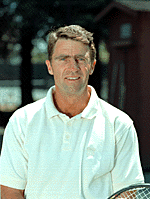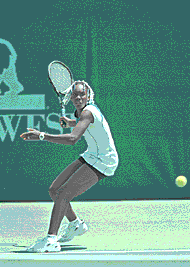|
<% ns_puts [mkm_getnavbar] %>
|
Does Richard Williams Know Something?by Jim McLennan
Sports psychologists compare internally versus externally motivated players. Internal motivation arises from the desire to master a skill, to perform at the highest capacity. External motivation arises out of the need to win trophies, to receive praise, to win matches. From this, an interesting distinction occurs between performance and outcome goals. And remember, it’s goals that keep an athlete alive. Performance goals are specific to the actual performance of skills, example, my goal is to stay loose and keep my serving rhythm during all big points. Now if I reach that goal I may or may not win, but in all likelihood my chances of winning will be far better if in fact I do serve well. The advantage of this type of goal is that the performer is in total control of their achievement of the goal. At the end of a match they can review whether they did in fact serve loosely and well on the big points. Outcome goals on the other hand are just that, they focus on the outcome of a match, and if the goal is to win, the athlete is never in complete control, the ability of the opponent, court conditions, and even luck can all interfere with the outcome. As a player continues to achieve his/her goals they are more likely to remain involved and motivated. This leads to are athletes who are likely to play well for many years. Far too often junior players experience success at an early age, but fail to improve their skills with passing years. For many of those juniors, orientation was never about acquiring skills or internal motivation but about performance goals, winning. So when a coach indicates they need to change the grip on the serve, or learn an approach shot, many successful players fail to continue improving at the rate of the performance oriented athletes. This is not my opinion, it is a generally accepted fact within an area of psychology known as attribution theory.
To bring this closer to home, in 1990 and 1991 I had the privilege of coaching the top players in the Northern California section at the National Intersectional tournament. They were highly talented and successful, but nearly all outcome oriented. In our post match discussions of the skills they would need to move to the next level, they were uniformly disinterested, for any attempt to change their game was perceived as an opportunity to play worse. One young man, however, was of a different motivation and focus, Brandon Coupe. Brandon showed interest in acquiring new skills and in continuing to build his game. I take no credit for any of his professional success, but he is the only player of that group of 16 over two years who has made a dent in the professional circuit, and when I met him, he was one of the lower players on the team. That is, Brandon continued to and continues to improve as this is being written, because his focus was on the big picture, his motivation was internal, and his goal was mastery of the game. Richard Williams avoided the junior tournaments, and instead focused on the acquisition of skills. This attitude drove the girls to performance goals, and to internally focused motivation. It takes either courage or foresight to explore the lesser traveled path, but to a practiced coach and veteran observer of the game, skill is where the game is at. When the skills are in place the winning takes care of itself. And it does not necessarily follow that junior competition builds the correct motivational orientation. Take a look at boxing. Notice when the latest contender fights for the title, their record is generally 32 wins and 1 loss , or 41 and 0, but never 14 wins and 21 losses. The fighters must believe in themselves and by bringing them along slowly, their confidence grows apace with their skills. In a similar way, Venus and Serena never really "fought" before they were truly ready. Junior players play tournaments for the experience. Well, in a 32 draw one-player experiences the feeling of winning a tournament, perhaps 3 more feel satisfied to have reached the semifinals, and the remaining 28 experience losing in one form or another. Confidence, the expectation of success, is generally based on memory and in rare instances on imagination. In all likelihood, the child who won the tournament is expecting to win again, for he or she remembers the previous win. But for most of the players who did not win, their confidence can be shaken. And in many instances after a long and arduous junior career, the experience of playing tournaments is actually the experience of successive tournament losses. Not exactly a confidence building scenario, and if the wins were in fact there, the probability of an outcome orientation is overwhelming.. Developing junior players need to evaluate whether their focus is on the day to day "battles" or the long-term "war". I believe you will be able to spot who these types of players are. They are the future greats, the ones who choose mastery of the sport over winning and losing, though they are not necessarily the ones who are winning today's battles. |
|
Last Updated 9/1/98. To contact us, please email to: webmaster@tennisone.com TennisONE is a registered trademark of TennisONE and SportsWeb ONE; Copyright 1995. All rights reserved. |
||

 Summarize the junior tournament careers of Serena and Venus
Williams, It’s fairly easy to do - they did not play junior tennis. How then did they
develop the skills necessary to play professional tournaments? The key word here is
skills, not winning, not match play, but SKILLS.
Summarize the junior tournament careers of Serena and Venus
Williams, It’s fairly easy to do - they did not play junior tennis. How then did they
develop the skills necessary to play professional tournaments? The key word here is
skills, not winning, not match play, but SKILLS.